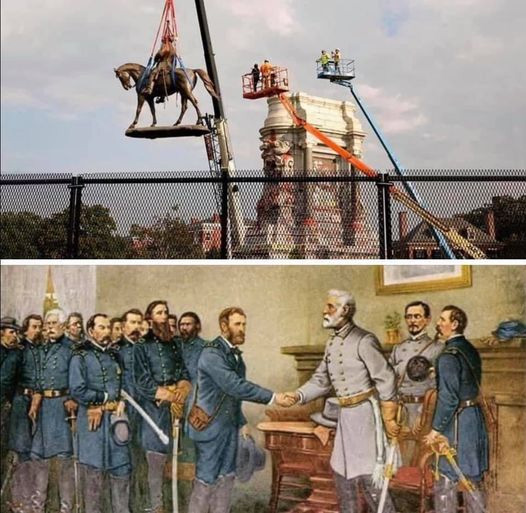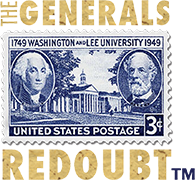The Demonization of Confederates

Should descendants of Confederates be ashamed of their ancestors or feel obligated to apologize for their past?
Were all Confederates evil? Does everyone who served in the Confederacy deserve universal condemnation?
The actual combatants on both sides of the Civil War did not believe so. Although hard feelings certainly lingered, most were able to bury the hatchet and work toward reconciliation in the immediate aftermath of the war. Robert E. Lee was a leading voice for such efforts.
Yet the modern trend to demonize and dehumanize those who hold opposing points of view has reopened old wounds that had almost totally healed in America. When you believe that the other side is demonic or sub-human, then you feel justified (if not duty-bound) to eliminate your opponent by any means necessary. Violence, terror, and intimidation are excusable when facing the threat of evil.
That mindset led to riots and hysterical protests throughout the country in the chaotic pandemic year of 2020, particularly after George Floyd’s death. Angry mobs followed Saul Alinsky’s Rules For Radicals, particularly his rule to “Pick the target, freeze it, personalize it, and polarize it.” Robert E. Lee found himself in their crosshairs.
Self-described “progressives” are quick to claim the moral high ground when discussing America’s past. Many cannot concede that some of their targeted historical enemies may in fact have been good and decent people. The truth about Lee—that he was an honorable and virtuous man—poses a threat to progressives’ presumed monopoly on virtue.
The causes of the Civil War and the motives for each side to fight will be debated till the cows come home. While we can all agree that slavery was “a moral and political evil” (to quote Lee), most reasonable people will also agree that slavery was not the primary motivation for many (or most) of the combatants to fight. It was clearly not what motivated Lee to fight. See the following link “Was Lee a Defender of Slavery?”
Confederates like Lee have been unfairly demonized and erased. Their stories—particularly Lee’s story at W&L—deserve to be remembered.
Below are excerpts from Un-Cancel Robert E. Lee addressing the demonization of Confederates and W&L’s misguided efforts to distance itself from Lee due to his role in the Civil War.
The Board of Trustees at Washington and Lee issued the following statement in June of 2021: “We have reviewed campus symbols, names and practices, and we are making changes to remove doubt about our separation from the Confederacy and the Lost Cause.”
Translation: All references to the Confederacy on the campus of W&L are bad and therefore must be erased.
Yet how can anyone learn from history if history is erased?
Besides (and this may “trigger” some readers), not all Confederates were bad.
Noting that ninety-eight Confederate statues were removed in 2020—more than had been removed in all previous years combined—historian and commentator Lee Smith addressed the matter as follows: “There were bad people, for sure, but there were also very fine people, on both sides. Rejecting those terms by insisting on the absolute evil of everyone on the Confederate side, to the point that no statues to their war dead can be allowed to stand, is the true threat to our peace.”[1]
……..
The “University History” section of the Washington and Lee website contains the following disclaimer on Lee:
Lee, in particular, has become the subject of increasing scrutiny for his central role as the military leader of the Confederacy. We unequivocally denounce the motivations behind the Confederate cause that Lee chose to defend as well as the views of individuals and groups who employ Confederate imagery to promote an agenda of white supremacy, racism, and xenophobia.
We are committed to educating our community and the public about our namesakes and their role in shaping the history of this institution, our country, and the values that continue to inform our world today. That includes acknowledging that Robert E. Lee chose to fight on the side that sought to preserve the institution of slavery.[2]
Evidencing an overwhelming sense of shame for the university’s historic connection with Lee (and thereby with the Confederacy), W&L’s leadership has taken extraordinary measures to distance the university from him.
……….
In an op-ed to The Wall Street Journal in August 2023, former Navy Secretary and Virginia Senator Jim Webb—one of the most highly decorated Marines in Vietnam—wrote in defense of the Confederate memorial at Arlington National Cemetery:
Many soldiers in the North, and many more in the South, would have understood what John Hope Franklin (1915–2009), America’s most esteemed black historian, pointed out: In 1860 only 5% of whites in the South owned slaves, and less than 25% of whites benefited economically from slavery. An estimated 258,000 Confederate soldiers died in the war, about a third of all those who fought for the South. Few owned slaves. So why did they fight?[3]
It is a complicated question, and for soldiers on both sides, the answers varied and, in many cases, evolved over time. But one thing is certain: the suggestion that all Southerners fought solely to defend slavery is demonstrably incorrect.
………
Regardless of whose vision for America was best, in 1861 the secession of the Southern states posed an existential threat to the United States.
The role of tariffs in provoking Lincoln’s militant stance is often overlooked or minimized by modern historians. In 1861, tariffs provided more than 90 percent of the federal government’s revenue. The majority of these tariffs were paid by the Southern states. There was no income tax at the time. The federal government depended almost entirely on taxing imported goods arriving at ports such as Boston, New York, Baltimore, Charleston, Savannah, and New Orleans.
When the Confederate Constitution was enacted in 1861, it banned protectionist tariffs. The Northern states recognized that their ports—primarily Boston, New York, and Baltimore—faced an economic catastrophe. All trade from Europe would undoubtedly be diverted to the tariff-free Southern ports, not only decimating the Northern economy, but depriving the United States Treasury of 90 percent of its revenue. Tariffs were the lifeblood of the federal government.
… in his 1861 Inaugural Address, Lincoln repeatedly assured the public that he had no intention to end slavery. In fact, he stated that such a ban would be unconstitutional. But he threatened to use military force against any state that refused to collect the federal tariffs. This may explain his unwillingness to give up Fort Sumter.
Lincoln and his Northern supporters were panicked at the thought of free trade in Southern ports. Regardless of the prevailing consensus today among historians that the war was entirely about slavery, the monumental role of tariffs in precipitating the conflict cannot be ignored.
The desire among Lee’s critics to demonize him (along with all other Confederates) is nothing new. Many people wanted to hang him after the war. Many today feel equally passionate in their animus toward him.
In the last year of his presidency, Dwight D. Eisenhower received a letter from one such critic who expressed his displeasure with Eisenhower’s displaying an image of Robert E. Lee in his office. Despite his busy schedule, Eisenhower took the time to explain why he held Lee is such high esteem:
August 9, 1960
Dear Dr. Scott:
Respecting your August 1 inquiry calling attention to my often expressed admiration for General Robert E. Lee, I would say, first, that we need to understand that at the time of the War between the States the issue of secession had remained unresolved for more than 70 years. Men of probity, character, public standing and unquestioned loyalty, both North and South, had disagreed over this issue as a matter of principle from the day our Constitution was adopted.
General Robert E. Lee was, in my estimation, one of the supremely gifted men produced by our Nation. He believed unswervingly in the Constitutional validity of his cause which until 1865 was still an arguable question in America; he was a poised and inspiring leader, true to the high trust reposed in him by millions of his fellow citizens; he was thoughtful yet demanding of his officers and men, forbearing with captured enemies but ingenious, unrelenting and personally courageous in battle, and never disheartened by a reverse or obstacle. Through all his many trials, he remained selfless almost to a fault and unfailing in his faith in God. Taken altogether, he was noble as a leader and as a man, and unsullied as I read the pages of our history.
From deep conviction, I simply say this: a nation of men of Lee’s caliber would be unconquerable in spirit and soul. Indeed, to the degree that present-day American youth will strive to emulate his rare qualities, including his devotion to this land as revealed in his painstaking efforts to help heal the Nation’s wounds once the bitter struggle was over, we, in our own time of danger in a divided world, will be strengthened and our love of freedom sustained.
Such are the reasons that I proudly display the picture of this great American on my office wall.
Sincerely,
Dwight D. Eisenhower[4]
A native Kansan who served his entire military career in the United States Army, Eisenhower was most definitely not a Southern partisan. The same man who sent the Eighty-Second Airborne to protect the civil rights of black schoolchildren in Little Rock saw the good in Robert E. Lee and recognized the need for young Americans to “strive to emulate his rare qualities.”
If a man such as Eisenhower could see the greatness of Robert E. Lee, why is the Board of Trustees at W&L unable to do the same?
Gib Kerr ‘85
THE GENERALS REDOUBT
Donors of $500 or more will receive a signed copy of “Uncancel Robert E Lee”. To receive your copy, please reply with your pledge, along with your name, mailing address, and phone number. Your contribution will support our ongoing efforts to sponsor speakers, programs, and other initiatives in Lexington that will advance our mission to preserve the history, traditions, and values that made W&L great. Allcontributions received between now and January 31, 2025, will go towards the MATCHED GIFT OF $400,000 provided by a group of generous supporters!
You may contribute via credit card at https://www.thegeneralsredoubt.us/supportor check per information in italics below. WE NEED YOUR HELP! To donate by check please make payable to: The Generals Redoubt and mail to: The Generals Redoubt, P.O. Box 1097, Lexington, VA 24450. Thank you. The Generals Redoubt (TGR) is a non-partisan 501 (c) (3) organization that is not aligned with, nor supports, any political party, individual, or organization.
[1] Lee Smith, “How Charlottesville Broke the Peace,” Tablet, August 10, 2023.
[2] Washington and Lee University website, https://www.wlu.edu/the-w-l-story/university-history/
[3] Jim Webb, “Save the Confederate Memorial at Arlington,” The Wall Street Journal, August 18, 2023.
[4] Dwight D. Eisenhower Presidential Library, “Dwight D. Eisenhower, Records as President, 1953-1961; White House Central Files, President’s Personal File Series, Box 743, Folder PPF 29-S Lee, General Robert E.”
